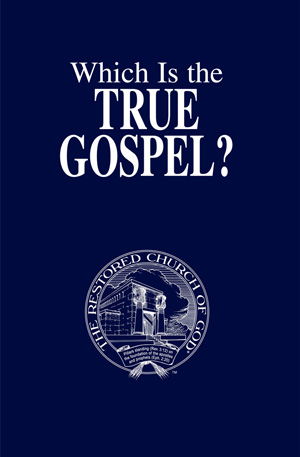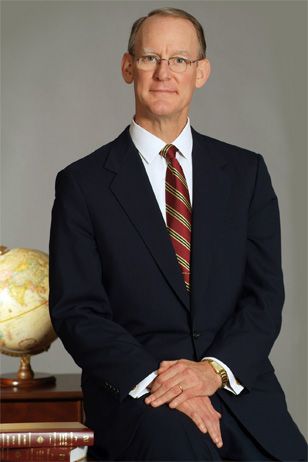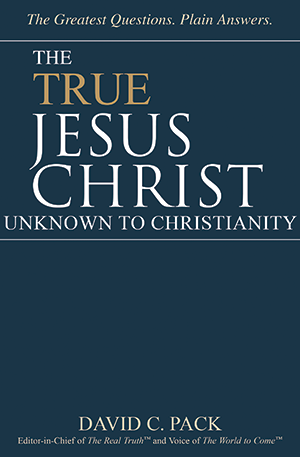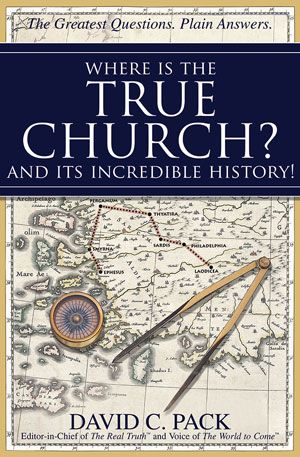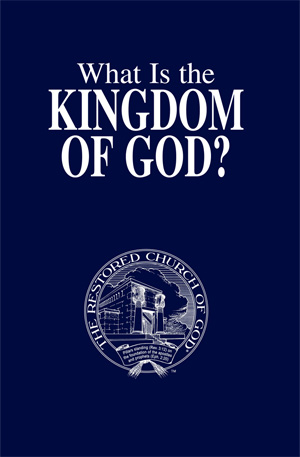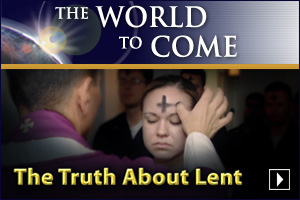Jesus commanded, “Repent you, and believe the gospel” (Mark 1:15). But exactly what is it that we—YOU—are supposed to believe? Just what is the true gospel? Do you know? Are you certain? Be careful of assumptions. For instance, did Christ teach the same gospel that Paul preached to the Gentiles? And what does the word “gospel” mean anyway?
The vast majority of professing Christians do not know the vital—all-important—answers to these most basic questions, and many others related to the true gospel of the Bible! This is because the knowledge of what the gospel really is has been hidden from the world for centuries!
Christ, at His First Coming, came as a first-century newscaster, bringing advance good news of staggering events to occur just beyond the horizon, and all the bad news occurring throughout today’s world. This climactic news involves you—and eventually every human being on Earth!
Six new books on religion are published every day in America! And there are over two thousand separate religions in America! Yet there has never been more confusion and disagreement about the answers to humanity’s problems. Troubles, woes, evils and human difficulties of every kind are multiplying. World peace is more elusive than ever. Why?
Why is there so much knowledge available to mankind, yet so much ignorance of the truth of the answers to life’s BIG questions?
All this has everything to do with the gospel!
Revelation 12:9 reveals, “Satan…deceives the whole world.” What a staggering statement! Do you believe it? If this is true, then it would certainly apply to the truth of a matter so crucial as the meaning and correct understanding of the gospel!
Many False Gospels
Almost everyone believes that the gospel is about the Person of Jesus Christ. Certainly, Christ plays an extremely important and central role to Christianity, but He is not the gospel. The Bible shows that Jesus is preached in conjunction with the gospel. Again, His role is enormous. But He is not the gospel.
Some proclaim a “gospel of salvation,” others a “gospel of grace.” Still others believe a “gospel of miracles” or a “social gospel.” Yet others think of the “gospel of foods” or of “healing” or of “faith.” And there are some who merely think of “gospel music” when they hear this word. These manmade ideas all ignore the truth of the Bible!
Notice Mark’s account again: “Now after that John was put in prison, Jesus came into Galilee, preaching the gospel of the kingdom of God.” This is the gospel that Jesus preached. It was in this same context that He said, “Repent you, and believe the gospel.” Which gospel?…of the “kingdom of God.”
Verse 1 in Mark refers to this message, when it states, “The beginning of the gospel of Jesus Christ.” The gospel of Jesus Christ was about the KINGDOM OF GOD—not something else! One must believe that gospel—not a humanly-devised counterfeit or substitute.
Strong Warning Not to Pervert It
This subject is so important that God inspired the apostle Paul to issue a warning to the Galatians then and to us now:
“I marvel that you are so soon removed from Him that called you into the grace of Christ unto another gospel: Which is not another; but there be some that trouble you, and would pervert the gospel of Christ. But though we, or an angel from heaven, preach any other gospel unto you than that which we have preached unto you, let him be accursed. As we said before, so say I now again, if any man preach any other gospel unto you than that you have received, let him be accursed” (1:6-9).
This is a very blunt statement—and a strong warning to all who will heed!
A little later, Paul stressed his hope that the “truth of the gospel might continue with you” (2:5). So there is one true gospel—with all others false!
Although some assert that Paul taught a different or additional gospel, it is plain that he never did. Ironically, God used Paul to warn against ever allowing such false teaching by pronouncing a curse on any man, angel or even any apostle—“But though we [apostles]…preach any other gospel…let him be accursed” (1:8)—who violates this command.
What a powerful scripture—and WARNING!
Paul explained that the apostles were entrusted by God to preserve the true gospel. Notice I Thessalonians 2:4: “But as we [apostles] were allowed of God to be put in trust with the gospel, even so we speak; not as pleasing men, but God, which tries our hearts.”
This is a responsibility not to be taken lightly. True ministers must always teach what God commands—not what pleases men (including Bible “scholars”). So any claim that Paul taught a different or second gospel (usually thought to be about Christ or of “peace”) is impossible. Had he done this, he would literally have been pronouncing a curse on himself!
Jesus Was Prophesied to Bring the Gospel
In the Old Testament, Jesus was prophesied to come as a messenger. Notice Malachi 3:1: “Behold, I will send My messenger [typed by John the Baptist in the first century], and he shall prepare the way before Me [the Father]: and the Lord [Christ], whom you seek, shall suddenly come to His temple, even the Messenger of the covenant, whom you delight in.”
Christ was the “messenger” of the gospel, not the message itself. And His message is actually the very core—the centerpiece!—of the entire Bible.
Now compare the passage in Malachi with another: “The law and the prophets were until John [only Old Testament scriptures had been preached previously]: since that time the kingdom of god is preached, and every man presses into it” (Luke 16:16). Recall that in Mark, Christ preached the “kingdom of God,” and called it the gospel.
Meaning of “Gospel”
The word gospel is an old English word meaning “god spell” or good news. The word kingdom is also an old English term, simply meaning “government.” Therefore, it is accurate to say that Christ preached “the good news of the government of God.” We will learn the who, what, where, when, why, and how of this good news, and how it relates to the Bible’s greatest prophecy.
The Kingdom of God is the dominant theme of not only the New Testament, but of the whole Bible. Yet, incredibly, most know little or nothing of it. This world’s ministers are oblivious to this gospel, and never preach about it. Therefore, virtually the whole world stands in complete ignorance of the single greatest truth in God’s Word!
How Many Times Mentioned?
The word gospel is found over 100 times in the Bible. Sometimes it is found alone, and sometimes “of the kingdom” follows it. Other times, it includes “of the kingdom of God,” or the equivalent phrase “of the kingdom of heaven.”
Note that it says, “of heaven,” not “in heaven.” It is heaven’s Kingdom, and there is a big difference between the two. Just as Kingdom of God means God’s Kingdom—not the Kingdom in God—the same is true of the Kingdom of heaven or heaven’s Kingdom. (While the phrase “kingdom of heaven” can specifically apply to certain phases of the Kingdom of God’s development, it still refers to God’s government on Earth. To learn much more about how the Kingdom arrives and expands, read our free booklet How God’s Kingdom Will Come – The Untold Story!)
Grasp this crucial point!
Throughout the New Testament, the word “kingdom” is found 27 times, “kingdom of God” 75 times, and “kingdom of heaven” 34 times. All are clearly one and the same.
What Paul Preached
Paul preached the Kingdom of God to the Gentiles. Yet, some believe that he preached a “different” gospel—again, unaware that it was Paul who pronounced a curse on anyone who did this (Gal. 1:8-9). However, while Paul preached the Kingdom of God, notice two verses in Acts showing that he did not neglect the subject of Christ’s role in the salvation process.
First, Acts 19:8 establishes which gospel he preached: “And he went into the synagogue, and spoke boldly for the space of three months, disputing and persuading the things concerning the kingdom of God.” In many of his epistles, he taught the Kingdom to Gentile congregations. His message was always the same. He continually preached, taught and referred to the Kingdom of God.
Next, Paul states in Acts 20:25, 21, “I have gone preaching the kingdom of God…repentance toward God, AND faith toward our Lord Jesus Christ.” He preached the same gospel to both Jew and Gentile.
Now notice Acts 28:30-31: “And Paul dwelt two whole years in his own hired house, and received all that came in unto him, preaching the kingdom of God, AND teaching those things which concern the Lord Jesus Christ.”
Luke, the writer of Acts, differentiates between preaching about the Kingdom of God and preaching about Jesus Christ! While both are vitally important, they are clearly two separate subjects!
In Acts 8:12, the deacon Philip also preached both of these same teachings: “But when they believed Philip…concerning the kingdom of God, AND the name of Jesus Christ, they were baptized, both men and women.” We see that Philip not only preached the Kingdom of God, but he also differentiated it from the teaching about Christ. Remember, the messenger is not the message.
Notice that these in Samaria were baptized only after “they believed” the right message—not some human idea about it. Also, Christ’s name was taught as an all-important, but additional, understanding.
Jesus is not the gospel. However, He does stand directly alongside the true gospel and will rule the entire Earth when He returns and establishes His Kingdom. Do not lose sight of this!
Finally, consider another verse where Paul himself made a distinction between the gospel and the person of Christ. II Corinthians 11:4 contains this powerful warning: “For if he that comes preaches another Jesus, whom we have not preached…or another gospel which you have not accepted, you might well bear with him” (the margin more correctly renders this last phrase “with me”). Paul wanted the Corinthians to reject false teachers and hold to what he had taught them. The point here is that Paul distinguishes between the teaching of a false Jesus and that of a false gospel. These are—and always have been—two separate things.
Some get confused when they read I Corinthians 15:1-4, thinking that Paul contradicts himself from other passages we have seen by stating that “the gospel” (vs. 1) is “how that Christ died for our sins according to the scriptures; and that He was buried, and that He rose again the third day” (vs. 3-4). Simply note that “the gospel” reference in verse 1 is not connected to Christ’s death for our sins and burial in verses 3 and 4. Careful reading reveals this. When correctly understood, rather than saying that Christ is the gospel, this passage confirms the opposite, and supports Acts 8:12, 20:21-25, 28:31 and II Corinthians 11:4!
Since Jesus preached “repent and believe the gospel,” it should now be clear why. His role must always be preached in conjunction with the Kingdom of God, because one cannot enter the Kingdom unless he understands and accepts that “Christ died for our sins,” and that person has repented of his sins.
Ask yourself: If Christ IS the gospel—is the Kingdom of God—then why did Paul (four times) and Philip speak of them as two separate matters?
All the Apostles Preached This Same Gospel
What evidence is there that other New Testament writers preached this same message? A great deal!
The apostle Peter also preached the Kingdom of God: “For so an entrance shall be ministered unto you abundantly into the everlasting kingdom of our Lord and Savior Jesus Christ” (II Pet. 1:11). So did the apostle James: “Hearken, my beloved brethren, has not God chosen the poor of this world rich in faith, and heirs of the kingdom which He has promised to them that love Him?” (2:5).
All of God’s Prophets Preached the Kingdom
Acts 3:19-21 contains an amazing statement: “Repent you therefore, and be converted, that your sins may be blotted out, when the times of refreshing shall come from the presence of the Lord; And He shall send Jesus Christ, which before was preached unto you: Whom the heaven must receive until the times of restitution of all things, which God has spoken by the mouth of all His holy prophets since the world began.”
Notice that Peter refers to “the presence of the Lord” (vs. 19). Verse 20 states that God “shall send Jesus Christ.” Verse 21 describes one period under God’s Kingdom as the “restitution of all things.” Peter stated that this “restitution” is something “God has spoken by the mouth of all His Holy Prophets since the world began.”
This is a stunning statement! But is it true?
Could God have actually used all of His prophets to announce His Kingdom? Bible scholars and religionists ignore this knowledge—and even reject it without examination.
Let’s review some examples.
The Pre-flood Preachers
The apostle Jude, Christ’s brother, stated, “Enoch [Noah’s great-grandfather]…prophesied…saying, Behold, the Lord comes with ten thousands of His saints, to execute judgment upon all” (vs. 14-15). These verses clearly are in the context of a world-ruling government, with authority to execute judgment on “all.”
II Peter 2:5 refers to Noah as the eighth preacher of righteousness. Jude wrote that Enoch was the “seventh from Adam.” These men were called “preachers of righteousness.” Including Abel, there were six other men who previously held this role, with their lives spanning the entire period between Adam and the Flood.
Careful review of Jude reveals that Enoch preached about sin and righteousness. All of these “preachers” spoke the same message. Remember, Peter said, “…since the world began.”
Abraham, Moses and Samuel
Was the gospel preached during the period following the Flood?
In Genesis 12:3, God said to Abraham, “…in you shall all families of the earth be blessed.” This verse is also referenced in Galatians 3:8, but is phrased a little differently: “…in you shall all nations be blessed.” This same verse states that the gospel was “preached before unto Abraham.” This is fascinating understanding! Not only did Abraham have the gospel preached to him (probably by Melchizedek), but it is also preached in Genesis, through the writings of Moses! How could all nations be blessed unless Christ establishes His government on Earth?
Moses was the first man that God raised up to lead Israel. While not a preacher of righteousness or an apostle, he was a prophet and a judge, preaching the gospel to ancient Israel when they were in the wilderness. Genesis 12:3 records the gospel, as does Numbers 24:17-19.
Acts 3:22 also shows that Moses, in effect, preached the coming Kingdom when he foretold that God would raise up a prophet (Deut. 18:15) to preach to the world (Acts 3:23) prior to Christ’s Coming, starting with the nations descended from ancient Israel (who was originally named Jacob).
Now consider Hebrews 3:9 and 4:2. These verses make clear that Moses preached the gospel to ancient Israel: “For unto us was the gospel preached, as well as unto them [ancient Israel]” (4:2).
These verses, along with Acts 3, show that this included the period all the way up to—and through—Samuel!
Notice how Acts 3:24 references Samuel as having preached the gospel: “Yes, and all the prophets from Samuel and those that follow after, as many as have spoken, have likewise foretold of these days.”
These are clear and powerful statements that cannot be glossed over. Take a moment to reflect on what you have read. This verse says, “all God’s prophets…as many as have spoken…foretold of these days.”
David
David was a king. But even he preached the Kingdom of God! In Psalm 67:4, he wrote, “…for You [God] shall judge the people righteously, and govern the nations upon earth.” This obviously refers to God’s coming government. Nations are on Earth, not in heaven!
Isaiah and Jeremiah
Isaiah wrote, “For unto us a Child is born, unto us a Son is given: and the government shall be upon His shoulder: and His Name shall be called Wonderful, Counselor, The Mighty God, The Everlasting Father, The Prince of Peace. Of the increase of His government and peace there shall be no end, upon the throne of David, and upon His kingdom, to order it, and to establish it with judgment and with justice from henceforth even forever” (9:6-7).
This prophecy is so obvious that it needs no explanation!
Jeremiah wrote, “Behold, the days come, says the Lord, that I will raise unto David a Righteous Branch, and a King shall reign and prosper, and shall execute judgment and justice in the earth. In His days Judah shall be saved, and Israel shall dwell safely: and this is His name whereby He shall be called, THE LORD OUR RIGHTEOUSNESS” (23:5-6, but also read verses 7-8).
As with Isaiah, these verses need no further explanation. The prophet Jeremiah directly preached the gospel!
Ezekiel and Daniel
Ezekiel wrote this of Israel’s descendants, alive today: “For I will take you from among the heathen, and gather you out of all countries, and will bring you into your own land” (36:24).
The next ten verses describe a period of rebuilding and national prosperity that can only happen after Christ’s Return. Take time to read them. They are unmistakably clear.
And Daniel wrote, “And in the days of these kings shall the God of heaven set up a kingdom, which shall never be destroyed: and the kingdom shall not be left to other people, but it shall break in pieces and consume all these kingdoms, and it shall stand forever” (Dan. 2:44).
Did Daniel preach the Kingdom of God? The Bible answers, “yes”—repeatedly!
All the Minor Prophets
With the possible exception of Jonah (who must have preached it outside of his book), all of the Minor Prophets recorded the gospel of the Kingdom of God in one way or another.
Remember, seeing the phrase “the gospel of the kingdom of God” is not the only proper way of describing this coming government! Genesis 12:3 and Galatians 3:8 have already shown this.
Review the following verses. In each case, you will find that they refer, directly or indirectly, to the Kingdom of God: Hosea 2:16, 19; 3:5; Joel 2:21-27; Amos 9:11-15; Obadiah 21; Micah 4:1-3; Habakkuk 2:14; Zephaniah 3:14-20; Zechariah 14:1-3, 8-9; Malachi 3:1-3.
Peter was right. “God has spoken by the mouth of all His holy prophets since the world began…the restitution of all things”—that can only occur with the coming of God’s government.
It is important to make one final point from this verse. It says, “God has spoken by the mouth of…” The gospel of the Kingdom of God is a message from God. It should be clear that God speaks through whatever kind of servant He is using—prophet, patriarch, judge, deacon, preacher of righteousness, king, apostle or pastor!
His servants always spoke the same message!
Matthew’s account mentions “gospel of the kingdom” three times. Notice: “And Jesus went about all the cities and villages, teaching in their synagogues, and preaching the gospel of the kingdom, and healing every sickness and every disease among the people” (9:35). In most of His parables, Christ taught the basics of the Kingdom of God. Matthew alone makes over fifty references to it.
Luke records that Jesus Christ commissioned His disciples to preach this same message: “Then He called His twelve disciples together...And He sent them to preach the kingdom of God” (9:1-2). Soon after, He sent seventy others to preach, and they also carried the message of the “kingdom of God” (10:1, 9).
Standing before Pontius Pilate on the night He was betrayed, Christ gave an important clue to understanding the Kingdom: “My kingdom is not of this world [this present society]” (John 18:36). We will discover the details later of how God’s government will be established on Earth.
Separate Gospel of Jesus Christ?
Recall, yet again, Mark 1:1: “The beginning of the gospel of Jesus Christ.” What is the “gospel of Jesus Christ”? Is this a different, second gospel? Regarding Paul, we could ask, on the other hand, did he forget about this gospel?
No! But most modern preachers teach that the gospel of Jesus Christ is about Jesus Christ. They claim that He is the Kingdom of God—that the gospel of the Kingdom refers exclusively to Him. But this is not what the Bible says! The gospel of Christ is His gospel—His message about the Kingdom of God!
Messengers carry messages. Remember, Christ was a Messenger sent from God with an announcement. His message was not about Himself—it was about the Kingdom of God! In John 12:49-50, Christ said, “For I have not spoken of Myself; but the Father which sent Me, He gave Me a commandment, what I should say, and what I should speak. And I know that His commandment is life everlasting: whatsoever I speak therefore, even as the Father said unto Me, so I speak.”
Plainly, Christ functioned as a messenger—a representative—a SPOKESMAN for the coming Kingdom of God.
In John 14:24, Jesus said, “The word which you hear is not Mine, but the Father’s which sent Me.” Christ brought the Father’s message. This should now be clear! Recall that He stated, “The law and the prophets were [preached] until John: since that time the kingdom of God is preached” (Luke 16:16).
That is what this Work is doing today, and, through this booklet, the Kingdom of God is being preached to you.
What Is the Kingdom of God?
Matthew 6:33 states, “But seek you first the kingdom of God, and His righteousness…” If you are to seek something as your first goal and focus in life, you must know exactly what it is!
This chapter contains what many call “The Lord’s Prayer” (vs. 9-13). Christ instructs Christians to pray “after this manner,” and then continues by adding the phrase, “Thy kingdom come.” Knowing what you are praying for will make your prayers far more meaningful! (This booklet’s primary purpose is to explain the true gospel of the Bible. To understand the Kingdom of God in detail, read our booklet What Is the Kingdom of God?)
But we should ask, at least briefly: What is the Kingdom of God? Again, the word kingdom simply means “government.” Of course, you cannot have a government without a nation to govern. Therefore, a kingdom is at least one nation with a government.
There are four necessary components of any kingdom: (1) Land, property or territory—however large or small. In other words, one must have a specific and definite set of boundaries establishing the size of the kingdom, (2) a ruler, king, monarch or governor leading the government, (3) people or subjects living within the territory governed, and (4) a system of laws and rules and a basic structure of government.
No kingdom is complete without all these basic elements.
But how does this apply to God’s Kingdom? Is this to be a literal, physical place on Earth, with people and laws, presided over by a ruler?
Most do not understand even these most basic elements of the Kingdom of God. Some believe that this Kingdom is in the hearts of men. Others believe that it is wherever you find a particular denomination. Still others believe that it is Jesus Christ Himself. Some believe that it is on Earth now, with others believing that it is yet to come, but not understanding how or when this will occur.
Such confusion!
One Must Be Born Again to Inherit the Kingdom
Paul wrote that Jesus, after His resurrection, became “the firstborn from the dead” (Col. 1:18), and “that He might be the firstborn among many brethren” (Rom. 8:29). When connected, these two verses show that Christ is the firstborn from the dead, and that many others will follow later. But when—and into what—will these others be born?
In John 3:3, Christ said to Nicodemus, “Verily, verily [this means truly, truly], I say unto you, Except a man be born again, he cannot see the kingdom of God.” In verse 6, He continues, “That which is born of the flesh is flesh; and that which is born of the Spirit is spirit.”
Believe this plain verse. One must become spirit to see the Kingdom of God!
Paul also wrote, “flesh and blood cannot inherit the kingdom of God” (I Cor. 15:50). The following two verses there explain that the resurrection will occur at the “last trump,” when “the dead shall be raised incorruptible, and we shall be changed.” (This is not the last or seventh trumpet of Revelation.)
This resurrection of the dead will occur when Christ returns to Jerusalem. There must be no misunderstanding this great event. People who were once fleshly human beings will be changed into spirit—will be born again—and enter into the Kingdom of God.
John 4:24 states that “God is a Spirit.” Under the Father, Christ will lead His Kingdom, to be composed of resurrected spirit beings. At His Return, Christ, as a member of the Family of God, will have many younger “brothers and sisters,” who will have qualified to rule with Him in His Kingdom.
There is a plant kingdom, an animal kingdom, human kingdoms and an angelic kingdom. There is also the Kingdom of God.
Notice Genesis 1:26: “And God said, Let Us make man in Our image, after Our likeness.” Referring to Themselves, the One speaking says, “Us,” “Our,” “Our.” This verse reveals that there is more than one Being in the Godhead. In fact, there are two! In this scripture, the Hebrew word for God is Elohim. This is a uniplural term like group, team, committee or family, with all of these terms representing one entity, comprised of several persons.
Thus, the Bible teaches that there is one God, composed of two Persons—the Father and Christ—with many more children to be added later.
At the time God has chosen, “many sons shall be brought unto glory” through the work of the “Captain of our salvation” (Heb. 2:10). Verse 11 says that Christ “is not ashamed to call them brethren”—those of whom Christ is called the “firstborn.”
Do you see what is described here? A true Christian’s goal—his destiny—is to be born into the coming Kingdom (government) of God as a spirit being who will rule under Christ. What could be more wonderful—more glorious—for a Christian to look forward to? (To learn more about this subject, read our book The Awesome Potential of Man.)
There Are Conditions to Entering the Kingdom
Christ said to a young rich man inquiring about eternal life, “…if you will enter into life, keep the commandments” (Matt. 19:17). Jesus explained that one must keep the Ten Commandments, and specifically cited five of them in the passage.
Let me explain. In Romans 6:23, Paul wrote, “For the wages of sin is death; but the gift of God is eternal life through Jesus Christ our Lord.” You receive wages from your job. These wages constitute payment for work you have done. Wages are something that you earn. Death is what all have “earned”—through sin! If Christ had not paid this penalty, the final “paycheck” that all people would receive is death—the ultimate “pink slip.” On the other hand, salvation is a gift. You cannot earn it.
But what is sin? Since committing it results in death, should you not know what it is? I John 3:4 records, “Sin is the transgression of the law.” This is the same law that the young rich man was told he must obey to inherit eternal life.
Recall Christ’s words in Mark 1:15: “Repent you, and believe the gospel.” Repentance is from sin (Acts 3:19)—the breaking of God’s spiritual Law. A Christian is one who has repented of this, and been baptized (Acts 2:38), and converted (3:19). Through a lifetime of overcoming sin, the Christian qualifies for (though he can never “earn”) salvation and spiritual birth into the Kingdom of God.
Mustard Seed Kingdom
Everyone knows Jesus spoke often in parables. In Matthew 13 alone, He presented seven—most very short. Each illustrates aspects of the Kingdom, collectively painting a full picture. The place to start is verse 31: “The kingdom of heaven is like to a grain of mustard seed, which a man took, and sowed in his field: which indeed is the least of all seeds: but when it is grown, it is the greatest among herbs, and becomes a tree, so the birds of the air come and lodge in the branches thereof” (vs. 31-32). The mustard seeds Jesus’ audience was familiar with were extremely small—very hard to see. This is why He called them the “least [meaning small in size] of all seeds.” God’s Kingdom is akin to microscopic when it arrives! No one focuses on this. It eventually grows into a world government, becoming the “greatest among herbs”—a “tree”—but it does not start that way. This parable is virtually never mentioned because nobody truly understands it.
So there could be no doubt of the Kingdom’s small beginning, the next parable confirms this: “The kingdom of heaven is like unto leaven, which a woman took, and hid in three measures of meal, till the whole was leavened” (vs. 33). The Greek word “hid” is egkrupto, meaning concealed in. Think of the modern equivalent—encrypted. Jesus says—literally—He is bringing an encrypted Kingdom. It is initially hidden—initially concealed among the nations!—but it expands because leaven always spreads. (Again, to learn more about how the Kingdom of God initially arrives, read How God’s Kingdom Will Come – The Untold Story! This booklet is incomplete without reading that one.)
Jesus underscores this in a third parable: “The kingdom of heaven is like unto treasure hid in a field; the which when a man has found, he hides, and for joy thereof goes and sells all that he has, and buys that field” (vs. 44). “Hid” here comes from krupto, meaning “to conceal by covering.” Christ’s message is again made clear: God’s Kingdom starts tiny, hidden—and covered. One must go and find it!
Yet another parable confirms this: “Again, the kingdom of heaven is like unto a merchant man, seeking goodly pearls” (vs. 45). Rare and precious, naturally occurring pearls are hard to find. “Who, when he had found one pearl of great price [it was hidden and he had to look for it], went and sold all that he had, and bought it” (vs. 45-46). Ask: Would anyone have to look for a Kingdom that was all over the Earth from its inception—which is the popular teaching? Besides reinforcing the mustard seed and leaven parables, the hid treasure and pearl parables also add focus to the value of entering the Kingdom.
The Kingdom of God Must Still be Preached Today
In the Matthew 24 (and 25) Olivet Prophecy, Christ was asked about those events that would be the signs of “the end of the world [age].” He answered that a number of different trends and conditions would occur first. In verse 14, He stated, “And this gospel of the kingdom shall be preached in all the world for a witness unto all nations; and then shall the end come.” The true gospel was prophesied to be preached until “the end come.” This would infer that someone will be preaching it now, in our present age—because the end has not yet come.
The Restored Church of God is doing this! (To learn more about the commission given to Christ’s one Church, read our book Where Is the True Church? – and Its Incredible History!)
Preaching the truth of the gospel to the world was spearheaded in the 20th century by Herbert W. Armstrong (1892-1986). This man was used by God to reach hundreds of millions of people with this message throughout a 52-year ministry, which ended with his death in 1986. It was Mr. Armstrong who taught me the true gospel and who trained me to be able to take this same message to the world.
The Kingdom of God Is Coming
Make no mistake! Christ will soon return to Earth and establish God’s Kingdom. No human being could set up a single, world-ruling government that could work. In late 1966, wondering about the possibilities, I asked my United States Congressman if he thought that this could ever happen. He had been in Congress for over thirty years, to that point. He loudly asserted that it was not possible. Interestingly, he did say that if he thought it could work, he would “shout it from the housetops.” I shall never forget his words. He was absolutely right—it certainly would never work, if left in the hands of men! But this is not what Christ will do.
Recall that Daniel wrote, “And in the days of these kings shall the God of heaven set up a kingdom, which shall never be destroyed: and the kingdom shall not be left to other people, but it shall break in pieces and consume all these kingdoms, and it shall stand forever” (Dan. 2:44). The Kingdom of God will reign over the entire Earth—ALL nations—and the saints shall share this reign with Christ.
Christ stated in the “Sermon on the Mount” that “the meek shall inherit the earth” (Matt. 5:5). Now you know why! Actually, Christ was quoting Psalm 37:11, where David said precisely the same thing. Other passages show that David knew he would one day rule (over all the tribes of Israel), within the Kingdom of God.
Now turn to Daniel 7 and examine three separate verses. Notice verse 18: “But the saints of the Most High shall take the kingdom, and possess the kingdom forever, even forever and ever.” Verse 22 states, “Until the Ancient of Days came, and judgment was given to the saints of the Most High; and the time came that the saints possessed the kingdom.” Then notice verse 27: “And the kingdom and dominion, and the greatness of the kingdom under the whole heaven, shall be given to the people of the saints of the Most High, whose kingdom is an everlasting kingdom, and all dominions [rulers] shall serve and obey Him.”
Daniel understood that the saints will reign on the Earth!
Now notice three separate passages in Revelation. Through John, Christ states, “To him that overcomes will I grant to sit with Me in My throne, even as I also overcame, and am set down with My Father in His throne” (3:21). Also notice 2:26-27: “And he that overcomes…to him will I give power over the nations: and he shall rule them with a rod of iron.” And, finally, “and [God] has made us…kings and priests: and we shall reign on the earth” (5:10).
Has anyone ever told you about any of these verses? Almost certainly not. Yet, they are basic, and have been in the Bible for thousands of years!
No wonder that when Christ was on trial for His life, He said, “My kingdom is not of this world: if My kingdom were of this world, then would My servants fight, that I should not be delivered to the Jews: but now is My kingdom not from here” (John 18:36). Pilate had asked Him, “Are you a king then?” Christ answered, “To this end was I born, and for this cause came I into the world…” (vs. 37).
Jesus Christ understood throughout His life that He was born to be a king (Luke 1:31-33)!
The prophet Isaiah was inspired to also record, “And it shall come to pass in the last days, that the mountain of the Lord’s house shall be established in the top of the mountains, and shall be exalted above the hills; and all nations shall flow unto it. And many people shall go and say, Come you, and let us go up to the mountain of the Lord, to the house of the God of Jacob; and He will teach us of His ways, and we will walk in His paths: for out of Zion shall go forth the law, and the word of the Lord from Jerusalem. And He shall judge among the nations, and shall rebuke many people: and they shall beat their swords into plowshares, and their spears into pruninghooks: nation shall not lift up sword against nation, neither shall they learn war any more” (2:2-4).
The exact same prophecy is repeated in Micah 4:1-3!
In front of the United Nations Building is the sculptured image of a large man forging a plow from a sword. I have seen it hundreds of times because I conducted Sabbath services directly across the street from that spot for over four years. But no one seems to any longer take notice of, or even believe, the enormous prophecy this famous sculpture depicts.
Christ came to be a KING. At a point after His reign begins, when He has defeated all enemies, world peace will literally “break out”—along with worldwide happiness, prosperity, abundance and supreme joy! No human government has ever been able to bring these things to even one country on Earth.
This soon-coming Kingdom is the core of the very gospel that Christ brought. Do you believe it? Will you believe it? (To learn more about the Jesus Christ of the Bible, read our extensive book The True Jesus Christ – Unknown to Christianity.)
The Restored Church of God is boldly preaching this greatest of prophetic truths. This prophecy is sure—it is certain! And, when it is fulfilled, you too can be a part of God’s wonderful government!



